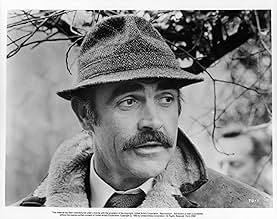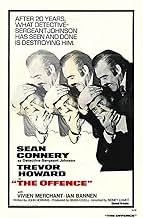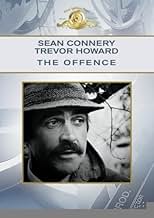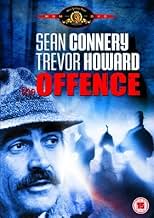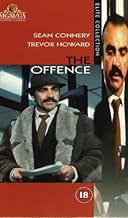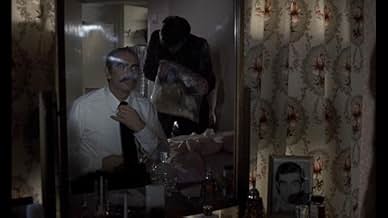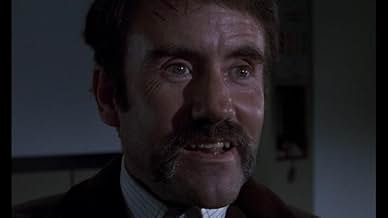VALUTAZIONE IMDb
6,9/10
8653
LA TUA VALUTAZIONE
Un detective della polizia britannica esausto finalmente scatta mentre interroga un sospetto molestatore di bambini.Un detective della polizia britannica esausto finalmente scatta mentre interroga un sospetto molestatore di bambini.Un detective della polizia britannica esausto finalmente scatta mentre interroga un sospetto molestatore di bambini.
- Nominato ai 1 BAFTA Award
- 1 candidatura in totale
John Cannon
- Police Constable
- (non citato nei titoli originali)
Les Conrad
- Detective
- (non citato nei titoli originali)
Timothy Craven
- Ambulance Man
- (non citato nei titoli originali)
Recensioni in evidenza
After returning to save the James Bond franchise with "Diamonds Are Forever," Sean Connery made a complete left-field choice for his next role. In "The Offence," he plays a stressed-out police officer on the verge of a nervous breakdown who is in a physical and psychological battle with a paedophile suspect he has in custody. Connery's character is also struggling with his own paedophile tendencies. It is an adaptation of John Hopkins play "This Story of Yours." It is essentially a two-hander for the most part with Connery and Ian Bannen (as the paedophile) trying to get the better of one another in the interrogation room of a police station.
Even though Sean Connery won his only Oscar for "The Untouchables", for me, this is by far his best performance. He is an absolute powerhouse in this going from shouting, snarling rage to raving and ranting about paedophiles to then sobbing like a child and begging forgiveness.
Ian Bannen is, if anything, even better than Connery here. His character veers from confused innocence to leering guilt, from screaming frustration to self-pity and then back to arrogance. It's an amazing performance. Sadly, Ian Bannen was killed in a car crash a few years back. A huge loss to the acting community.
While "The Offence" on the surface seems like a very British police procedural drama, it was, surprisingly, directed by the American Sidney Lumet. Like Lumet's best movies ("Twelve Angry Men," "The Hill", "Serpico" and "Dog Day Afternoon") this film features a character in an extremely pressurized situation. It's brave film-making at its darkest. Hollywood certainly took notice as Lumet was chosen to direct a young Al Pacino in two of his breakthrough movies "Serpico" in 1973 and "Dog Day Afternoon" in 1975 after this.
This is the kind of film that would not only never be made today, to even suggest it as an idea for a film would probably be the end of your career. So, if you're tired of CGI monsters and explosions and you want to experience raw acting at its finest, get a copy of this film. It is uncomfortable viewing due to its disturbing subject matter, but you won't see better acting anywhere. Highly recommended.
Even though Sean Connery won his only Oscar for "The Untouchables", for me, this is by far his best performance. He is an absolute powerhouse in this going from shouting, snarling rage to raving and ranting about paedophiles to then sobbing like a child and begging forgiveness.
Ian Bannen is, if anything, even better than Connery here. His character veers from confused innocence to leering guilt, from screaming frustration to self-pity and then back to arrogance. It's an amazing performance. Sadly, Ian Bannen was killed in a car crash a few years back. A huge loss to the acting community.
While "The Offence" on the surface seems like a very British police procedural drama, it was, surprisingly, directed by the American Sidney Lumet. Like Lumet's best movies ("Twelve Angry Men," "The Hill", "Serpico" and "Dog Day Afternoon") this film features a character in an extremely pressurized situation. It's brave film-making at its darkest. Hollywood certainly took notice as Lumet was chosen to direct a young Al Pacino in two of his breakthrough movies "Serpico" in 1973 and "Dog Day Afternoon" in 1975 after this.
This is the kind of film that would not only never be made today, to even suggest it as an idea for a film would probably be the end of your career. So, if you're tired of CGI monsters and explosions and you want to experience raw acting at its finest, get a copy of this film. It is uncomfortable viewing due to its disturbing subject matter, but you won't see better acting anywhere. Highly recommended.
A burnt-out British police detective investigates some astonishing crimes but after 20 years what Inspector-Sergeant Johnson (Sean Connery) has seen and done is destroying him. Things go wrong when eventually snaps whilst interrogating a suspected child molester called Baxter (Ian Bannen) . During the course of the interrogation takes place several surprises , twists and unexpected consequences.
Interesting and grim picture with tight editing , magnificent acting , thrills , plot twists , emotion and intense drama . It was originally conceived as a tense as well as thrilling flick about a complex interrogatory . It results to be an adaptation of a stage play titled : ¨This story of yours¨ by John Hopkings about a claustrophobic and strange duel betwen a suspicious child molester and a police officer obsessively convinced of his guilt , both of whom find themselves subtly changing places . Gripping and exciting picture about a cop who wants to investigate a grisly killing with unexpected consequences , outstanding the great Sean Connery playing very well a London detective who explodes at a police interrogation reacting against a child molester . Embedded in a realistic police procedure , thorny dialog and peculiar situations nowadays have a ring of arty melodrama ; nevertheless, riveting at times. Support cast is really excellent , such as: Trevor Howard, Vivien Merchant as starring's wife , Peter Bowles and especially Ian Bannen as prime suspect in a series of brutal attacks on young girls.
The motion picture was compellingly directed by the splendid US director Sidney Lumet , though here he failed at box-office. After starting an off-Broadway acting troupe in the late 1940s, he became the director of many television shows in the 1950s. Lumet made his feature film Adaptation of directing debut with 12 Angry Men (1957), which won the Golden Bear at the Berlin Film Festival and earned three Academy Award nominations. The courtroom drama, which takes place almost entirely in a jury room, is justly regarded as one of the most auspicious directorial debuts in film history. Lumet got the chance to direct Marlon Brando in The Figitive Kind (1960), an imperfect, but powerful adaptation of Tennessee Williams'. Sidney Lumet was a master of cinema , best known for his technical knowledge and his skill at getting first-rate performances from his actors and for shooting most of his films in his beloved New York . He made over 40 movies , often complex and emotional , but seldom overly sentimental . He achieved great successes such as ¨Serpico¨, ¨The Veredict¨, ¨Fail safe¨ , ¨ Morning after¨, ¨The hill¨ , ¨Dog day afternoon¨, ¨Murder on the Orient Express¨ , ¨Network¨ , ¨The Anderson tapes¨and his best considered one : ¨12 angry men¨ . In 2005 , Sidney Lumet received a well-deserved honorary Academy Award for his outstanding contribution to filmmaking. Rating . 6.5/10 . Above average . Well worth watching .
Interesting and grim picture with tight editing , magnificent acting , thrills , plot twists , emotion and intense drama . It was originally conceived as a tense as well as thrilling flick about a complex interrogatory . It results to be an adaptation of a stage play titled : ¨This story of yours¨ by John Hopkings about a claustrophobic and strange duel betwen a suspicious child molester and a police officer obsessively convinced of his guilt , both of whom find themselves subtly changing places . Gripping and exciting picture about a cop who wants to investigate a grisly killing with unexpected consequences , outstanding the great Sean Connery playing very well a London detective who explodes at a police interrogation reacting against a child molester . Embedded in a realistic police procedure , thorny dialog and peculiar situations nowadays have a ring of arty melodrama ; nevertheless, riveting at times. Support cast is really excellent , such as: Trevor Howard, Vivien Merchant as starring's wife , Peter Bowles and especially Ian Bannen as prime suspect in a series of brutal attacks on young girls.
The motion picture was compellingly directed by the splendid US director Sidney Lumet , though here he failed at box-office. After starting an off-Broadway acting troupe in the late 1940s, he became the director of many television shows in the 1950s. Lumet made his feature film Adaptation of directing debut with 12 Angry Men (1957), which won the Golden Bear at the Berlin Film Festival and earned three Academy Award nominations. The courtroom drama, which takes place almost entirely in a jury room, is justly regarded as one of the most auspicious directorial debuts in film history. Lumet got the chance to direct Marlon Brando in The Figitive Kind (1960), an imperfect, but powerful adaptation of Tennessee Williams'. Sidney Lumet was a master of cinema , best known for his technical knowledge and his skill at getting first-rate performances from his actors and for shooting most of his films in his beloved New York . He made over 40 movies , often complex and emotional , but seldom overly sentimental . He achieved great successes such as ¨Serpico¨, ¨The Veredict¨, ¨Fail safe¨ , ¨ Morning after¨, ¨The hill¨ , ¨Dog day afternoon¨, ¨Murder on the Orient Express¨ , ¨Network¨ , ¨The Anderson tapes¨and his best considered one : ¨12 angry men¨ . In 2005 , Sidney Lumet received a well-deserved honorary Academy Award for his outstanding contribution to filmmaking. Rating . 6.5/10 . Above average . Well worth watching .
The Offence is directed by Sidney Lumet and adapted to screenplay by John Hopkins from his own play titled This Story of Yours. It stars Sean Connery, Ian Bannen, Trevor Howard and Vivien Merchant. Cinematography is by Gerry Fisher and music by Harrison Birtwistle.
Detective Sergeant Johnson (Connery) has been with the British Police Force for two decades, in that time he has been witness to countless murders, rapes and other serious crimes. The images, the people he has had to deal with, have left a terrible mark on him. When suspected child sex attacker Kenneth Baxter (Bannen) comes up for interrogation by Johnson, his mind starts to fracture and he loses control, unleashing a dark side that comes out both physically and mentally.
You wouldn't think it possible for Lumet and Connery to have a hidden gem in their respective career outputs, but The Offence is very much just that. An unnerving skin itcher with an upsetting narrative core, The Offence was a commercial flop. It barely got released across the globe and only found its way onto home format release in the last 10 years. The film only got made after Connery struck a deal with United Artists, he would only return as James Bond for Diamonds Are Forever if they backed him for a couple of projects. One of which was The Offence, so with free licence to play Johnson, and his choice of Lumet in the directing chair, Connery got the film made.
Set with a bleak concrete back drop of a "New Town" (cheaply built monstrosities the government knocked up to ease the housing issues), The Offence is a fascinating blend of police procedural and psychological drama. It poses many questions, and thrives on ambiguity to the point repeat viewings are a must, but in the main what shrieks out is the thematic point of one mans harrowing employment taking its toll on he himself. Is it possible that you can only chase and be amongst monsters yourself for so long before you become one of that number? It's invariably hard to recommend the film as high entertainment, a comfy night in by the fire this film is not. But as film art, a searing character study and acting supreme, it scores impressively high whilst tantalisingly tickling the cranium.
It's fair to say it's very dialogue heavy, and Lumet as polished a director as he is, keeps it grainy, revelling in the bleakness of the story. Connery has never been better, utterly compelling, a brooding force of nature and as committed to role as he has ever been. Nor, too, arguably, has Bannen, the scenes shared between the two men are lessons in acting as they portray two warped minds bouncing off each with an unsettling force that grips us round the throat and refuses to let go long after the credits have rolled. Howard steps in to add a touch of mature quality, he too bringing the best out of Connery in the scenes they share, while Merchant as Johnson's "on the outside" wife, is raw and heartfelt.
You can't pigeon hole The Offence, it's very much one of a kind and it demands to be tracked down by serious film fans. From the low key score and foreboding 70s setting, to the gripper of a denouement, The Offence is an essential piece of British cinema. 9.5/10
Detective Sergeant Johnson (Connery) has been with the British Police Force for two decades, in that time he has been witness to countless murders, rapes and other serious crimes. The images, the people he has had to deal with, have left a terrible mark on him. When suspected child sex attacker Kenneth Baxter (Bannen) comes up for interrogation by Johnson, his mind starts to fracture and he loses control, unleashing a dark side that comes out both physically and mentally.
You wouldn't think it possible for Lumet and Connery to have a hidden gem in their respective career outputs, but The Offence is very much just that. An unnerving skin itcher with an upsetting narrative core, The Offence was a commercial flop. It barely got released across the globe and only found its way onto home format release in the last 10 years. The film only got made after Connery struck a deal with United Artists, he would only return as James Bond for Diamonds Are Forever if they backed him for a couple of projects. One of which was The Offence, so with free licence to play Johnson, and his choice of Lumet in the directing chair, Connery got the film made.
Set with a bleak concrete back drop of a "New Town" (cheaply built monstrosities the government knocked up to ease the housing issues), The Offence is a fascinating blend of police procedural and psychological drama. It poses many questions, and thrives on ambiguity to the point repeat viewings are a must, but in the main what shrieks out is the thematic point of one mans harrowing employment taking its toll on he himself. Is it possible that you can only chase and be amongst monsters yourself for so long before you become one of that number? It's invariably hard to recommend the film as high entertainment, a comfy night in by the fire this film is not. But as film art, a searing character study and acting supreme, it scores impressively high whilst tantalisingly tickling the cranium.
It's fair to say it's very dialogue heavy, and Lumet as polished a director as he is, keeps it grainy, revelling in the bleakness of the story. Connery has never been better, utterly compelling, a brooding force of nature and as committed to role as he has ever been. Nor, too, arguably, has Bannen, the scenes shared between the two men are lessons in acting as they portray two warped minds bouncing off each with an unsettling force that grips us round the throat and refuses to let go long after the credits have rolled. Howard steps in to add a touch of mature quality, he too bringing the best out of Connery in the scenes they share, while Merchant as Johnson's "on the outside" wife, is raw and heartfelt.
You can't pigeon hole The Offence, it's very much one of a kind and it demands to be tracked down by serious film fans. From the low key score and foreboding 70s setting, to the gripper of a denouement, The Offence is an essential piece of British cinema. 9.5/10
What happens when a cop is finally pushed over the edge? When all the depravity he's seen throughout his decades on the force, all the sick, violent images rolling around in his head inevitably become intolerable? In this adaptation of John Hopkins play 'This Story of Yours,' you'll see, and witness one of Sean Connery's finest pieces of acting, as well another cinematic triumph from director Sidney Lumet.
Connery stars as Detective Johnson, a tough-as-nails cop investigating the rape of a young child. It's routine for him, as he specialises in the violent and the brutal. He's been doing it for twenty years and has seen everything that can be seen. However, when confronted with a strange man- masterfully played by Ian Bannen- who was picked up near the crime scene, he snaps, cascading into a tangled web of memories, violence and insanity.
Connery and Lumet first joined forces for 1965's 'The Hill', a powerful, intriguing war drama set in a North African military prison. They then reteamed in 1971 on the slick crime caper 'The Anderson Tapes.' The two evidently enjoyed a positive experience working together, and for their third collaboration decided to try something a little darker and more abstract: 'The Offence.' (They made two more films, 1974's brilliant 'Murder on the Orient Express' and 'Family Business,' in 1989; but the less said about that mis-cast, unfunny crime comedy the better).
'The Offence' is a fascinating study about the effect of violence on one's mental state, a dark police procedural and a riveting drama all at once. Anchored by a career best Connery, the film moves at a brisk pace, rapidly establishing a paranoid, seedy atmosphere of psychological malfunction. John Victor Smith's tight editing is outstanding, and under Lumet's direction brings us some very frightening, expertly cut sequences.
In a long and varied career, this may be cinematographer Gerry Fisher's finest hour. Due to his composition and framing, scenes look and feel claustrophobic (whether indoors or out), which adds to the tense atmosphere running throughout the film. He captures the growing madness of Connery's character masterfully and has an artful touch when it comes to shooting scenes of violence that is striking and understated.
Connery has never disappeared inside a character as thoroughly as he does here (with the possible exception of Daniel Dravot in John Huston's 'The Man Who Would Be King'): never once can you spot him acting. His Detective Johnson is an unbalanced, frightened, occasionally cruel man who has seen too much violence in his life to continue on as normal. Memories of murder and mayhem overwhelm him, and Connery captures the PTSD-like effects the character experiences with great sympathy, depth and understanding- it's one of his finest on-screen performances.
The supporting cast is filled with talented actors- Trevor Howard has a small but meaty role, and Vivien Merchant steals her all too brief scene as Johnson's long-suffering wife Maureen- but Ian Bannen stands apart from the pack. As an odd character who may or may not be a child molester, he is slick and seedy; like a snake-oil salesman for the devil's brew. His scenes with Connery are some of the darkest and morally vague you're ever likely to see. His performance rivals Dennis Hopper's in 'Blue Velvet' as one of cinema's most entertaining and insidious creeps.
The film goes to some very sinister places, but never becomes painful to watch. The story is handled with care and intelligence- Hopkins's screenplay is just as powerful as his original theatrical production- and has some unforgettable moments. Lumet and Connery together were a force to be reckoned with, as this obsidian-dark, clever crime drama proves. It's a fantastic, well-written and devastatingly entertaining piece of filmmaking.
Connery stars as Detective Johnson, a tough-as-nails cop investigating the rape of a young child. It's routine for him, as he specialises in the violent and the brutal. He's been doing it for twenty years and has seen everything that can be seen. However, when confronted with a strange man- masterfully played by Ian Bannen- who was picked up near the crime scene, he snaps, cascading into a tangled web of memories, violence and insanity.
Connery and Lumet first joined forces for 1965's 'The Hill', a powerful, intriguing war drama set in a North African military prison. They then reteamed in 1971 on the slick crime caper 'The Anderson Tapes.' The two evidently enjoyed a positive experience working together, and for their third collaboration decided to try something a little darker and more abstract: 'The Offence.' (They made two more films, 1974's brilliant 'Murder on the Orient Express' and 'Family Business,' in 1989; but the less said about that mis-cast, unfunny crime comedy the better).
'The Offence' is a fascinating study about the effect of violence on one's mental state, a dark police procedural and a riveting drama all at once. Anchored by a career best Connery, the film moves at a brisk pace, rapidly establishing a paranoid, seedy atmosphere of psychological malfunction. John Victor Smith's tight editing is outstanding, and under Lumet's direction brings us some very frightening, expertly cut sequences.
In a long and varied career, this may be cinematographer Gerry Fisher's finest hour. Due to his composition and framing, scenes look and feel claustrophobic (whether indoors or out), which adds to the tense atmosphere running throughout the film. He captures the growing madness of Connery's character masterfully and has an artful touch when it comes to shooting scenes of violence that is striking and understated.
Connery has never disappeared inside a character as thoroughly as he does here (with the possible exception of Daniel Dravot in John Huston's 'The Man Who Would Be King'): never once can you spot him acting. His Detective Johnson is an unbalanced, frightened, occasionally cruel man who has seen too much violence in his life to continue on as normal. Memories of murder and mayhem overwhelm him, and Connery captures the PTSD-like effects the character experiences with great sympathy, depth and understanding- it's one of his finest on-screen performances.
The supporting cast is filled with talented actors- Trevor Howard has a small but meaty role, and Vivien Merchant steals her all too brief scene as Johnson's long-suffering wife Maureen- but Ian Bannen stands apart from the pack. As an odd character who may or may not be a child molester, he is slick and seedy; like a snake-oil salesman for the devil's brew. His scenes with Connery are some of the darkest and morally vague you're ever likely to see. His performance rivals Dennis Hopper's in 'Blue Velvet' as one of cinema's most entertaining and insidious creeps.
The film goes to some very sinister places, but never becomes painful to watch. The story is handled with care and intelligence- Hopkins's screenplay is just as powerful as his original theatrical production- and has some unforgettable moments. Lumet and Connery together were a force to be reckoned with, as this obsidian-dark, clever crime drama proves. It's a fantastic, well-written and devastatingly entertaining piece of filmmaking.
Sean Connery is more a superstar than an actor. Although his talents have been recognised by the Academy (for his rather unconvincing turn as an Irish cop in The Untouchables (1987)) and remembered for his role as the first James Bond, he is high up on his own pedestal, a gift for voice actors and one of the handsomest faces ever to have graced the screen. But anyone in doubt of his ability as a proper thespian need look no further than his grim, tormented portrayal of a cop who has seen one too many dead bodies in Sidney Lumet's The Offence, a huge flop at the box office and a film now faded into memory, ripe for a re-discovery.
Playing with time Rashomon (1950)-style, the film begins in slow motion, where an unknown disturbance at a police station has a few officers panicked. It is revealed to be Detective Sergeant Johnson (Connery) standing over the bloodied body of suspect Kenneth Baxter (Ian Bannen), with fellow police officers scattered on the floor. It then goes back, and we are in a grey, miserable city gripped in panic as a child-killing paedophile roams free. The latest disappearance of a young girl has Johnson riled, and officers cruising the street pick up Baxter, who is wandering alone in the night covered in mud. The young girl is found raped but alive by Johnson himself, who insists on spending some time alone with the suspect.
Based on John Hopkins' stage play This Story of Yours, Connery fought tooth-and-nail to adapt it for the big screen, eventually reprising his role as Bond in Diamond Are Forever (1971) in return for the green-light. Although the film consists of long, talky scenes, Lumet uses stylish editing in order to avoid being stagy and to delve further into his anti-hero's head. His reputation as a no- nonsense director betrays him here, as scenes of gruesome murders, body parts, and a host of other atrocities Johnson has witnessed flash before our eyes. The use of slow motion in the flashback moments also employs a sort of circular filter at the centre of the screen, reflecting Johnson's disconnection from his actions but getting slightly tiresome in the process.
There are three long, outstanding scenes. The first is Johnson returning home to his wife (Vivien Merchant) following his interrogation of Baxter, drinking heavily and exploding at the one person who could possibly help him. The second is Johnson's own interrogation with superintendent Cartwright (the ever-excellent Trevor Howard), a man who has witnessed the same level of horror himself, but has learnt to separate his work from his life, something Johnson is unable to do. The third is the extended interrogation of Baxter, where Bannen's creepy turn surely must have been an inspiration for the Joker-Batman verbal showdown in The Dark Knight (2008). It's incredibly bleak stuff, but the raw honesty of the script and performances makes this powerful stuff.
www.the-wrath-of-blog.blogspot.com
Playing with time Rashomon (1950)-style, the film begins in slow motion, where an unknown disturbance at a police station has a few officers panicked. It is revealed to be Detective Sergeant Johnson (Connery) standing over the bloodied body of suspect Kenneth Baxter (Ian Bannen), with fellow police officers scattered on the floor. It then goes back, and we are in a grey, miserable city gripped in panic as a child-killing paedophile roams free. The latest disappearance of a young girl has Johnson riled, and officers cruising the street pick up Baxter, who is wandering alone in the night covered in mud. The young girl is found raped but alive by Johnson himself, who insists on spending some time alone with the suspect.
Based on John Hopkins' stage play This Story of Yours, Connery fought tooth-and-nail to adapt it for the big screen, eventually reprising his role as Bond in Diamond Are Forever (1971) in return for the green-light. Although the film consists of long, talky scenes, Lumet uses stylish editing in order to avoid being stagy and to delve further into his anti-hero's head. His reputation as a no- nonsense director betrays him here, as scenes of gruesome murders, body parts, and a host of other atrocities Johnson has witnessed flash before our eyes. The use of slow motion in the flashback moments also employs a sort of circular filter at the centre of the screen, reflecting Johnson's disconnection from his actions but getting slightly tiresome in the process.
There are three long, outstanding scenes. The first is Johnson returning home to his wife (Vivien Merchant) following his interrogation of Baxter, drinking heavily and exploding at the one person who could possibly help him. The second is Johnson's own interrogation with superintendent Cartwright (the ever-excellent Trevor Howard), a man who has witnessed the same level of horror himself, but has learnt to separate his work from his life, something Johnson is unable to do. The third is the extended interrogation of Baxter, where Bannen's creepy turn surely must have been an inspiration for the Joker-Batman verbal showdown in The Dark Knight (2008). It's incredibly bleak stuff, but the raw honesty of the script and performances makes this powerful stuff.
www.the-wrath-of-blog.blogspot.com
Lo sapevi?
- QuizWhen Sean Connery agreed to return as James Bond in Agente 007 - Una cascata di diamanti (1971), as part of his deal, United Artists had to back two movies of his choice that would cost $2 million or less. This was to be the first; a Connery-directed version of "Macbeth" was to be the second. When this movie failed at the box office and Roman Polanski beat Connery to the screen with Macbeth (1971), Connery's version of "Macbeth" was cancelled.
- BlooperA ladder leaning against the wall in the hallway outside of the police interrogation room is clearly labeled "TFS" for "Twickenham Film Studios."
- Citazioni
Kenneth Baxter: Nothing I have done can be one half as bad as the thoughts in your head.
- ConnessioniFeatured in Big Screen: The Battle of the Bonds (1998)
I più visti
Accedi per valutare e creare un elenco di titoli salvati per ottenere consigli personalizzati
- How long is The Offence?Powered by Alexa
Dettagli
Botteghino
- Budget
- 900.000 USD (previsto)
Contribuisci a questa pagina
Suggerisci una modifica o aggiungi i contenuti mancanti

Divario superiore
By what name was Riflessi in uno specchio scuro (1973) officially released in India in English?
Rispondi
